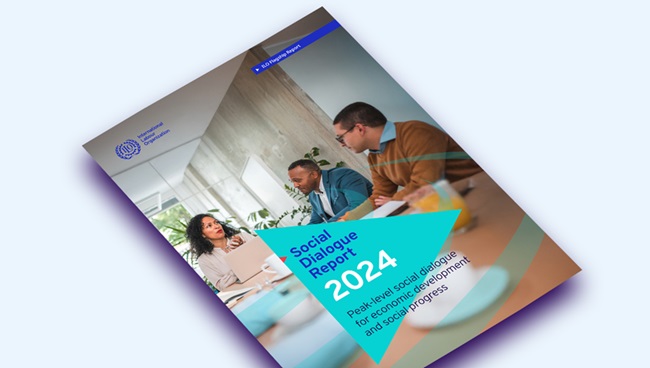Prelims Exam: Current Affairs
Mains Exam: General Studies Paper- 2( Development process and development industry- Role of NGOs, self-help groups, various groups and associations, donors, philanthropic organizations, institutional and other parties, important aspects of governance, transparency and accountability) |
Reference:
The International Labour Organization (ILO) published the 'Social Dialogue Report' amidst economic and geopolitical instability.

About the Social Dialogue Report:
- Basis of the report: This report has been prepared on the basis of a global review of Peak-Level Social Dialogue (PLSD) processes and results and the effectiveness and inclusiveness of National Social Dialogue Institutions (NSDIs).
- It includes a survey of 71 employers and workers' organizations from 38 countries, including India.
- Significance: Social dialogue has established itself as a credible governance model for addressing complexities, identifying appropriate solutions, and advancing social justice.
- Indian Context: The report highlights the experience of the Platform-based Gig Workers (Registration and Welfare) Bill to establish the Rajasthan Platform-based Gig Workers Welfare Board.
- The Rajasthan Gig Workers Welfare Board has 12 members, of which 6 are from the government and 2 each from gig workers, aggregators and civil society.
Key findings of the report:
- Between 2015 and 2022, countries' compliance with freedom of association and effective recognition of the right to collective bargaining has declined by 7%.
- This decline is due to increased violations of fundamental civil liberties and bargaining rights of employers, workers and their representative organizations
Key recommendations presented in the report:
- Need for economic development: Social dialogue can enable countries to pursue economic development along with social progress, and ensure a low-carbon transition and digital transformation in an equitable and inclusive manner.
- Fundamental freedoms at work: The report recommends governments to maintain effective recognition of fundamental principles and rights at work, especially freedom of association and the right to collective bargaining.
- Focus on PLSD: The report calls on member countries to increase the resources and technical capacities needed by labour administrations and social partners for effective participation in PLSD.
- Increased access: The ILO also recommends NSDIs in different countries to increase their access to under-represented groups.
- Regular evaluation: The report suggests regular, evidence-based evaluation of the role and impact of PLSD institutions in socio-economic decision-making.
|
Top-Level Social Dialogue (PLSD) Processes:
- PLSD consists of processes that bring together representatives of governments, employers and professional membership organisations and workers' organisations (social partners) at national and regional levels.
- These processes are designed to facilitate dialogue, consultation and exchange of information on issues relating to labour, economic and social policy.
- PLSD bilateral processes involve only social partners (workers' organisations) and tripartite processes also involve government representatives.
|



